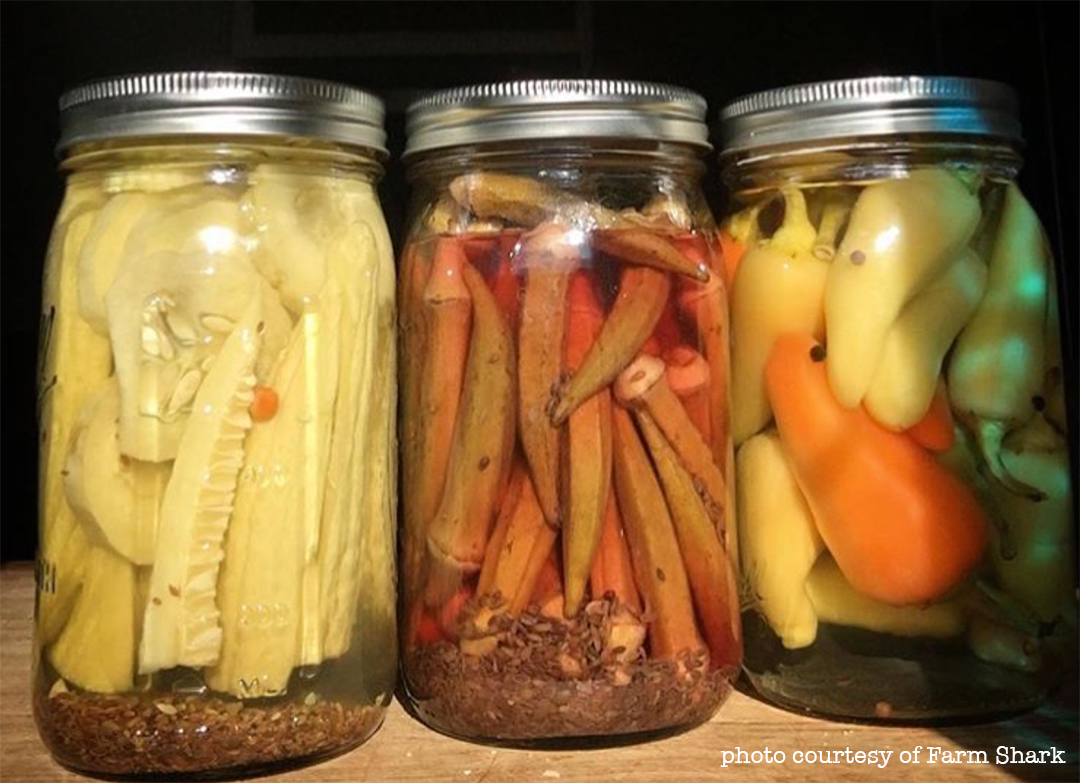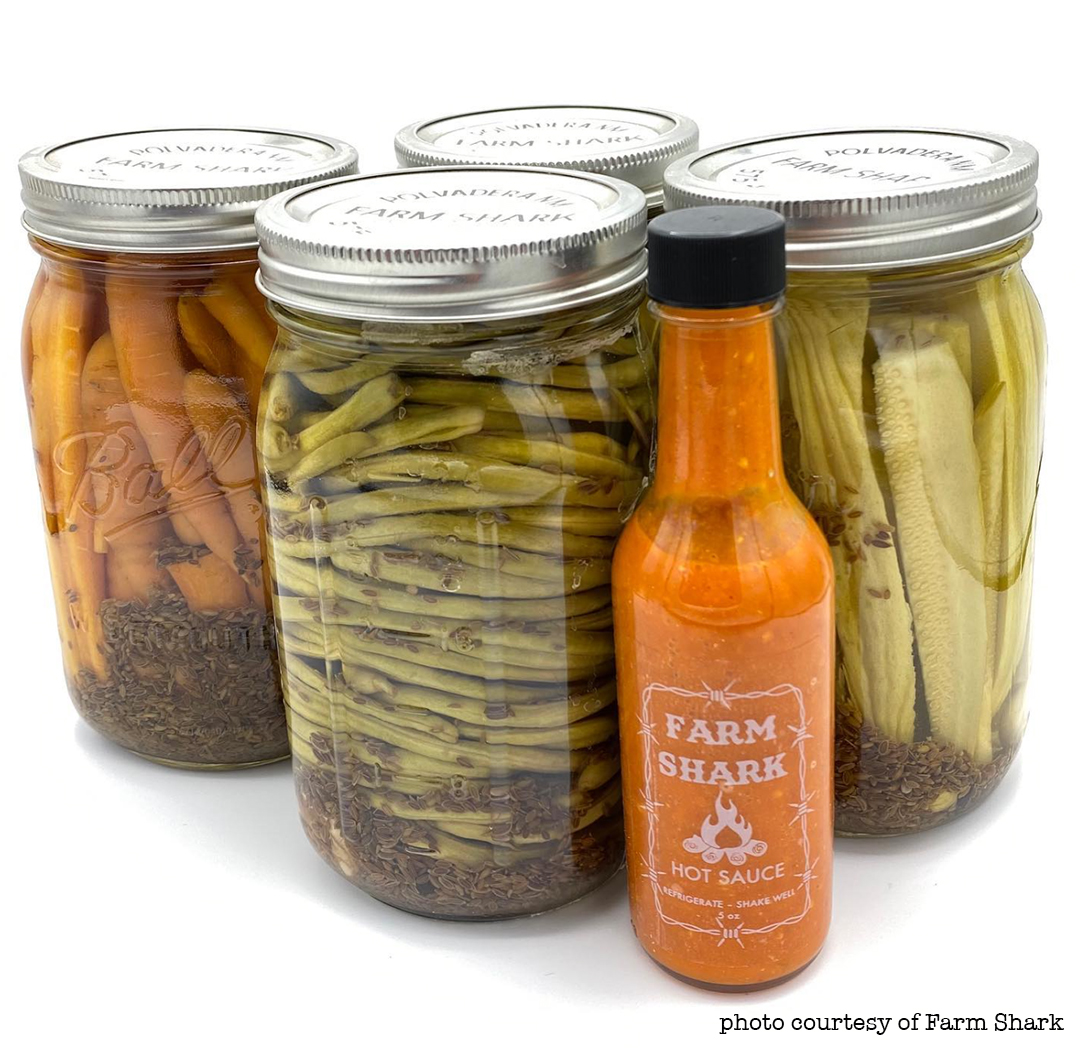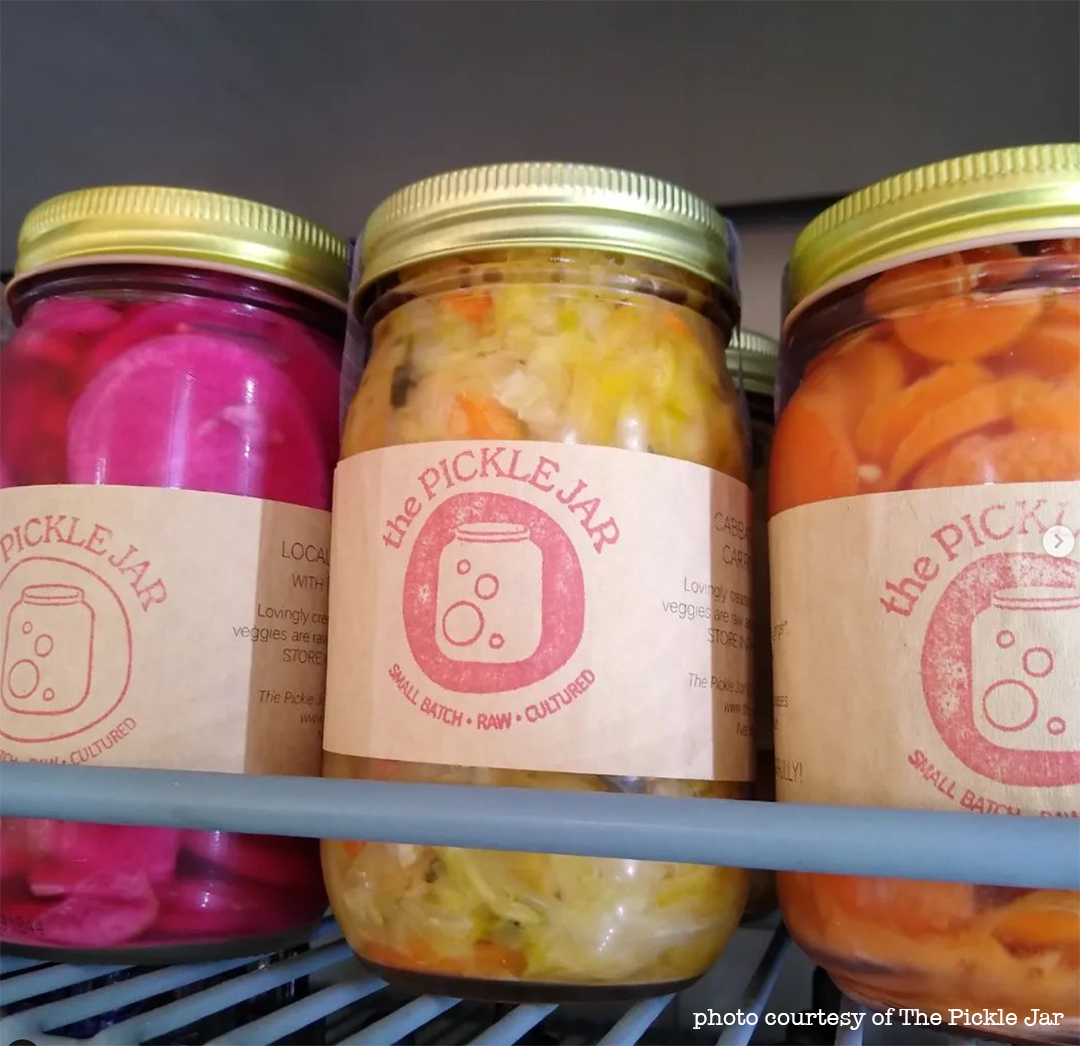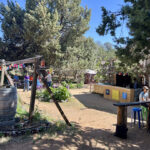
Fermentation—the conversion of carbohydrates into alcohol, acid, or gas—is one of the oldest of human food processes. A means of preservation and transformation that’s evolved alongside us and helped us evolve in turn, fermentation remains mysterious to many, even as we enjoy the fruits of this most human of labors nearly every day: from beer and wine to cheese and bread to yogurt and soy sauce.
Fermentation was once a common practice, but today it’s often misunderstood and even feared. How many of us imagine horrifying scenarios of something rancid and very alive coming out of a jar that’s been hidden in a dark cupboard?
Sandor Ellix Katz’s exhaustive The Art of Fermentation quotes USDA research microbiologist and professor Fred Breidt on the question of safety. “Risky is not a word I would use to describe vegetable fermentation. It’s one of the oldest and safest technologies we have.” So long as we follow basic rules and understand the underlying principles of how salt brining works its magic, fermentation is a stable, safe practice.
New Mexico is home to a veritable abundance of local fermenters. Inspiration seems to flow freely through these businesses, evidence of a healthy and vibrant ecosystem—or that other most human of phenomena: culture. Katz said it best, I think: “We call the starters that we add to milk to make yogurt, or to initiate any fermentation, cultures. Simultaneously, culture constitutes the totality of all that humans seek to pass from generation to generation, including language, music, art, literature, scientific knowledge, and belief systems, as well as agriculture and culinary techniques (in both of which fermentation occupies a central role). In fact, the word culture comes from Latin cultura, a form of colere, ‘to cultivate.’ Our cultivation of the land and its creatures—plants, animals, fungi, and bacteria—is essential to culture.”
In that spirit, these four businesses offer a sampling of the culture of fermentation in our state.
Barrio Brinery
1413 B West Alameda, Santa Fe
Products also available via Dr. Field Goods at Sawmill Market, Los Poblanos Farm Shop, New Mexico Harvest CSA, and Squash Blossom
When Pat Block and Yvette De La O started exploring the idea of creating Barrio Brinery in 2013, the New Mexico Environment Department had never worked with a business like it. “They knew two things in their hearts,” Block told me, “one, that hot food and cold food are safe, but food at room temperature isn’t; and two, that bacteria is bad. So when I said, ‘I’d like to make products by leaving vegetables at room temperature in brine for several weeks to grow bacteria,’ I’m sure they thought, ‘My god, this guy is going to kill us all.’”
Luckily, Block was equal to the task of what he now calls a “mutual education process” with the state. Assisted by Breidt, he used academic papers to support the science of fermentation and prove its safety. The business began producing fermented foods in 2014, and in 2018 Barrio Brinery received edible New Mexico’s Local Hero award in the category of Food Artisan. Today they produce fermented cucumbers (available as kosher-style dill pickles with New Mexico red chile, half-sour pickles, hot-and-spicy pickles, garlic pickles, and others), as well as dilly beans, escabeche, and sauerkraut—all brine fermented—at their shop in Santa Fe.
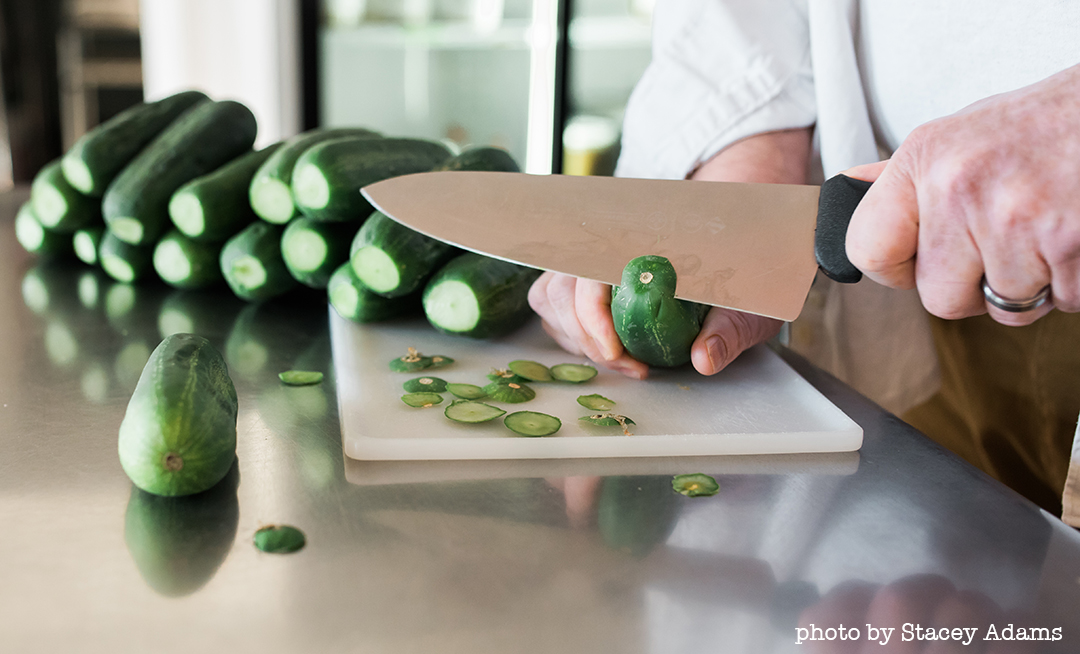
Barrio Brinery does business with restaurants as diverse as The Shed in Santa Fe and Pancho’s Gourmet To Go in Pecos. Hit hard by lockdowns during the early part of the pandemic, the business got creative, developing and producing a vinegar-pickled red onion for a chicken sandwich being sold at Blake’s Lotaburger. Though the sandwich is no longer available, producing a hundred jars every two to three weeks helped keep the business afloat during the toughest months of the pandemic.
In addition to their fermented products, Barrio Brinery carries MiYoung’s Farm Korean Seoul Food Kimchi, local sodas from Zia, a few home fermentation supplies, and some other fun products for the pickle enthusiast, items Block laughingly calls “picklephernalia.” An advocate of the health benefits of fermented foods, he’s happy to answer questions from home picklers.
Farm Shark
Products available via Polk’s Folly Farm Butcher Shop and Farm Stand and New Mexico Harvest CSA
Farming is a family affair for Zoey Fink and Carlos McCord of Farm Shark. Growing up in Lemitar, McCord farmed with his mother, Cecilia Rosacker, and the recipe that the couple uses for their products comes from her mother, Rita Rosacker. “That woman does everything. She is amazing,” Fink reports, reverently, of Rita.
Fink and McCord grow the cucumbers, long beans, jalapeños, sweet peppers, okra, and carrots found in their vinegar-pickled products on three plots in Albuquerque’s South Valley. Their garlic is grown at Cecilia’s farm in Lemitar. In addition to their vinegar pickles—a process that starts with acid, rather than producing it as brine fermentation does—Farm Shark makes a fermented hot sauce from a blend of their peppers.
Farm Shark supplies vegetables to restaurants and markets around Albuquerque. But it’s the pickles that have allowed Fink and McCord to farm full time, a transition they made in 2020. Fink describes pickling not only as a way to preserve the harvest but also a way to “capture the heat and flavors of summer to enjoy all year. It’s a natural companion to the seasonality of the farming process,” she says. Pickling inspires both adventurousness and experimentation: “Flavors from the air and changes in temperature are literally at play in the food.”
As veterans of Albuquerque’s Downtown Growers’ Market—Fink was an intern and manager at the market and built and ran the refugee farm program at Tres Hermanas—Fink and McCord have found other ways to make their products available in the Albuquerque area. The pair hold pickle pop-ups at breweries during the cooler months, and their pickled okra flavors the Bloody Mary at Still Spirits. They welcome orders from their website for pickup at their house, and they are always receptive to questions about farming, vegetables, and pickling. Says Fink, “We’re just so happy to be doing what we do in the place that we love.”
The Pickle Jar
Products available via the Santa Fe Farmers’ Market and the Downtown Growers’ Market in Albuquerque
“You’re riding on the back of thousands of years of people making mistakes and finding what works,” Alima Lopez tells me, sitting in the shade outside her Santa Fe kitchen. “It feels good to be carrying that on, and it feels important.”
Lopez has been pickling since her college days in Albuquerque, when she would pick up produce too old or ugly to sell in grocery stores at the Albuquerque Center for Peace and Justice. For her, “[fermentation] is an important piece to closing the gap in the local food system. We have a farmers market all year round, but over the winter there’s a [period of time] where there’s very little available at the market; and there are months when the farmers literally cannot move all of their vegetables. When you look at traditional food systems and how people survived through the winter, this is how they do it: there has to be food preservation.” Since 2021, she has been selling pickles and fermented mustards and hot sauces as The Pickle Jar, a move that grew out of her love for holistic food and medicine. For years before starting her business, Lopez shared her ferments with friends.
Lopez works closely with local farmers to source the vegetables for her kimchis, sauerkrauts, and pickles, which are available seasonally. “I tell people not to get married [to their favorite products]” she tells me, laughing; she is committed to working within the Santa Fe foodshed. Two kinds of sauerkraut, Ginger Lemon and Dukkah Spice, are available consistently. The rest of her products change based on what is in greatest abundance.
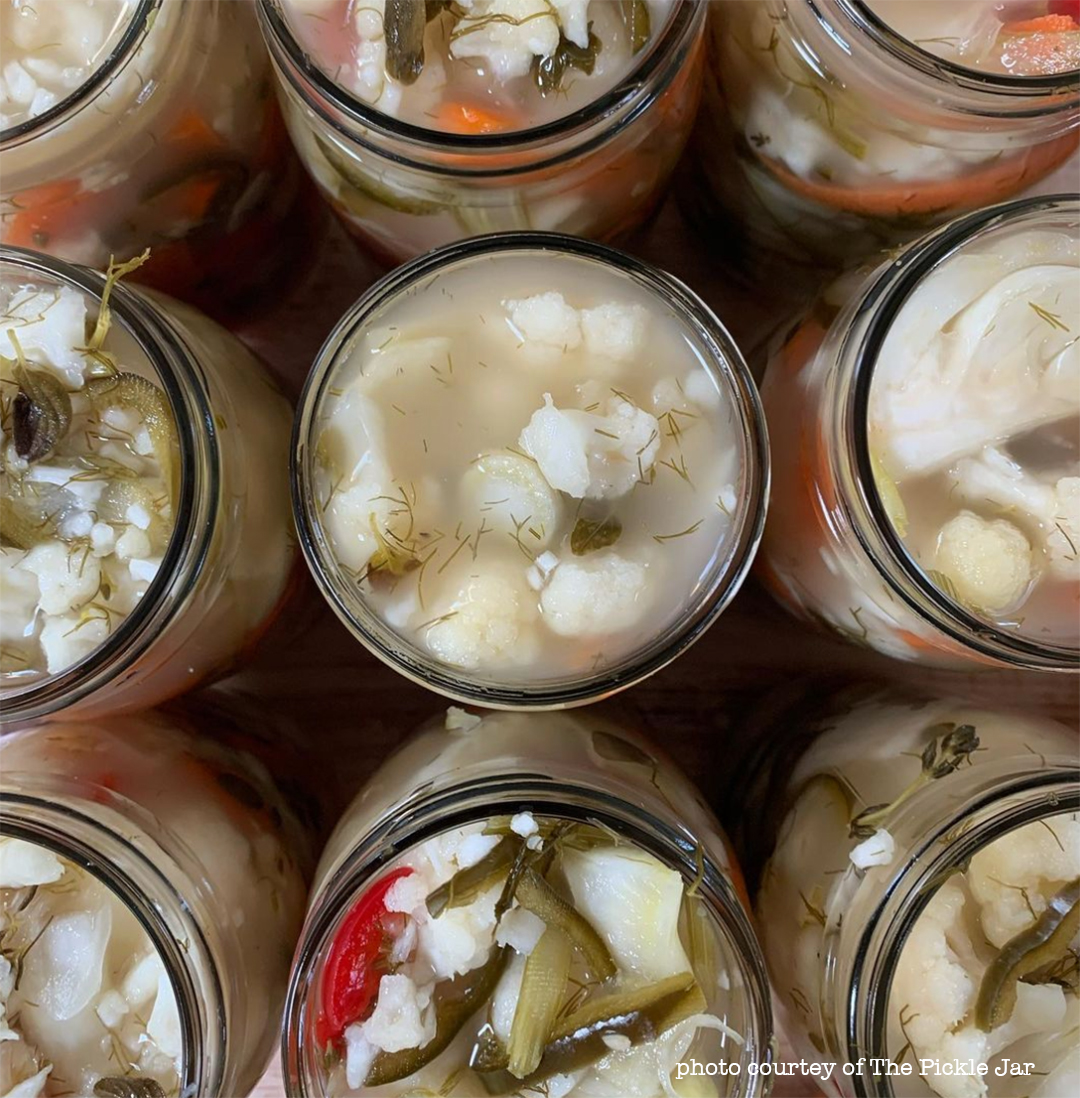
Lopez is an adventurous pickler, and she’s always developing new recipes. Any produce that isn’t jarred is turned into hot sauce, and she brings all of these products to the Santa Fe Farmers’ Market on Saturday mornings. In addition to her weekly spot at the Santa Fe market she can be found on alternating weekends at the Downtown Growers’ Market in Albuquerque. There she also sells her fermented mustards, and the flavors she’s developed read like the offerings of a spice bazaar: Whole Grain, Red Currant Rosemary, Turmeric Garlic, Red Chile Honey, and Green Chile Coriander. (Customers in Santa Fe can find mustards on The Pickle Jar website.)
All of The Pickle Jar’s products are available for pickup in Santa Fe through the website as well, and Lopez offers a recycling program. When customers return used jars to be sterilized and reused, they receive a discount on their next purchase.
MiYoung’s Farm Korean Seoul Food Kimchi
Products available via Barrio Brinery, Reunity Resources, Los Poblanos Farm Shop, tiny grocer ABQ, Polk’s Folly Farm Butcher Shop and Farm Stand, and New Mexico Harvest CSA
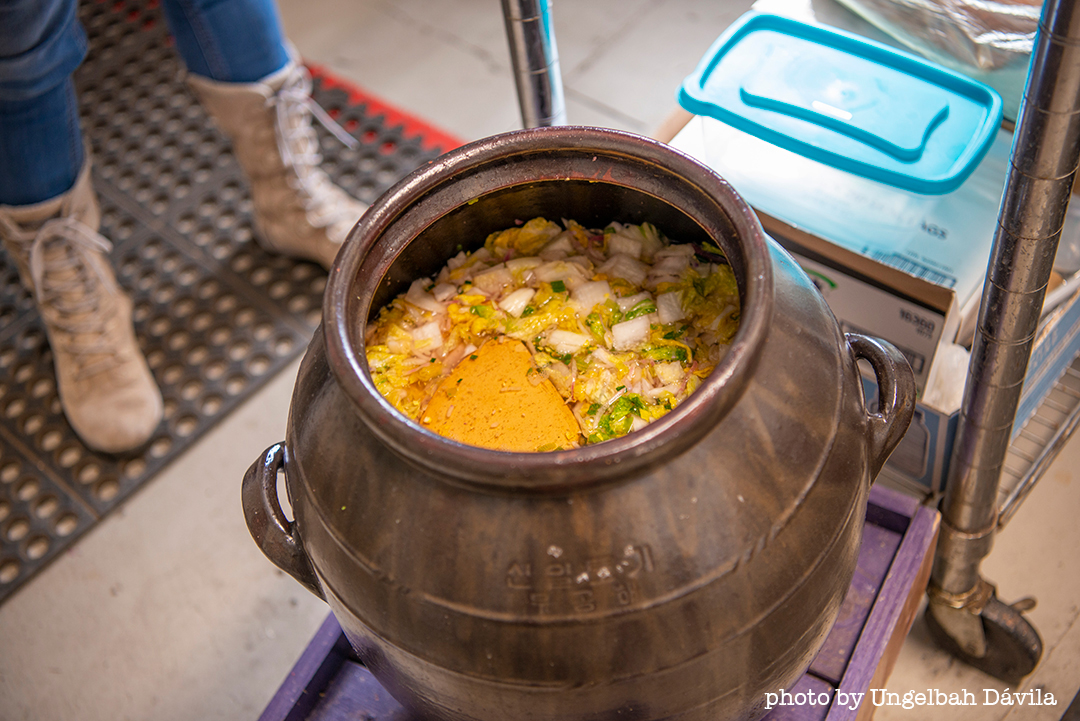
While most Americans know what kimchi is by now, when Jenn Yi started MiYoung’s in 2014, the condiment was still not widely known to New Mexicans. For the uninitiated, she describes it as Korean sauerkraut.
Born in Seoul and raised in San Francisco, Yi started making kimchi when she moved to New Mexico and found herself longing deeply for home; she remembered her mother throwing everyone out of the kitchen on Sundays because it was “kimchi time.” When she started sharing her ferments with friends and then friends of friends and then friends of friends of friends, she followed the demand, and her “seed-to-label” business took off—even in spite of doubts some people shared as she planned. She named the new business after her daughter.
Going into her ninth year, Yi is grateful, palpably so. “I saw a lot of businesses shut down during the pandemic and I was so scared that I was next . . . but my business actually grew. I feel so much gratitude for the customers who come and tell me they love my product. It makes them feel good and they’re feeling the health benefits of having kimchi in their diet after several months. You don’t see instant changes, but that commitment from people who are caring for themselves and supporting a local business makes it a full-circle place of gratitude for me.”
Traditional kimchi is made of napa cabbage, daikon radish, salt, green onions, garlic, ginger, chile pepper flakes, and “something funky from the ocean,” Yi tells me. “South Korea is a peninsula, and there are fishing villages up and down. There’s no standard recipe for kimchi: every family does it differently, and they each add something special: raw oysters, shrimp paste, fish sauce, even whole chunks of fish.” MiYoung’s offers traditional kimchi in an assortment of spice levels, as well as a vegetarian kimchi and seasonal blends. Her products are popular with people of all ages and demographics, from the young children of fellow farmers market vendors, to “old vets who come up and start speaking to me in Korean.”
Yi grows the vegetables herself in the South Valley of Albuquerque and tends to her crocks vigilantly. “It’s passion work. It has to be. But really it’s in response to the overwhelmingly beautiful love and support I’ve received from my community and the encouragement they give me constantly. Without them I have no business, I have no work.”
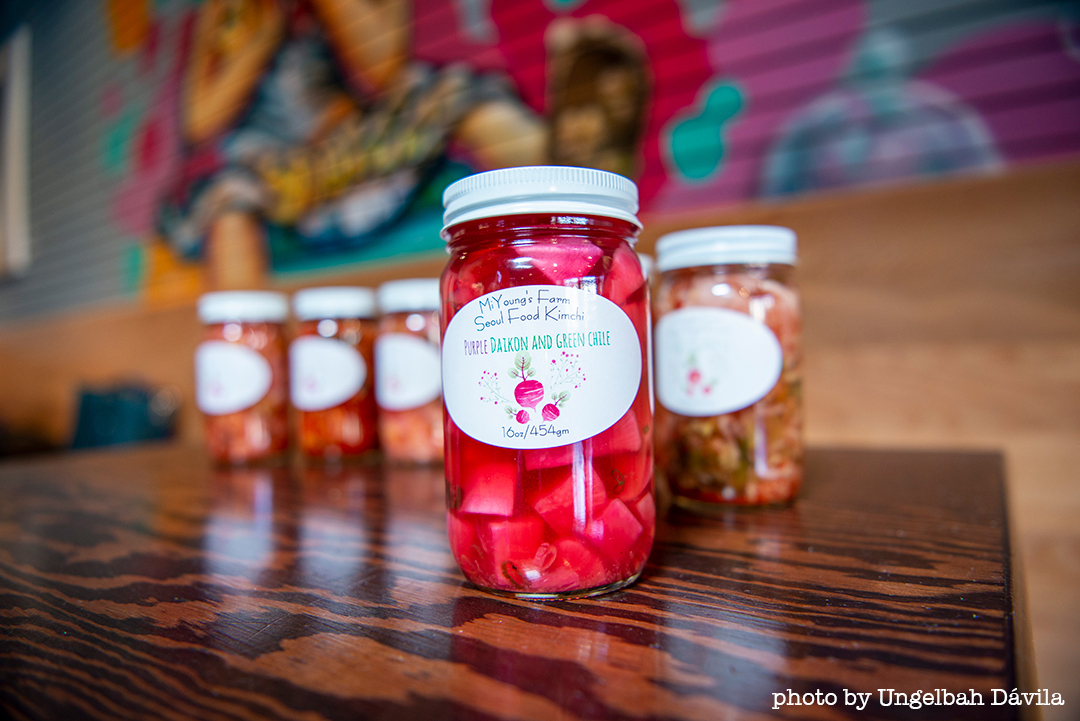
Pickle enthusiasts and novices alike will find plenty in our local food system to suit all their cravings—and may be inspired to try the process themselves. Happy pickling!
leticia gonzales
leticia gonzaleslives and works in Santa Fe, New Mexico.



